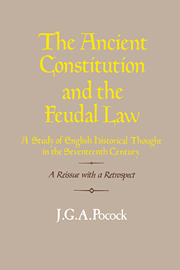 The Ancient Constitution and the Feudal Law
The Ancient Constitution and the Feudal Law Book contents
- Frontmatter
- Contents
- Preface
- Preface to the First Edition
- Part One The Ancient Constitution and the Feudal Law
- I Introductory: the French Prelude to Modern Historiography
- II The Common-law Mind: Custom and the Immemorial
- III The Common-law Mind: the Absence of a Basis of Comparison
- IV The Discovery of Feudalism: French and Scottish Historians
- V The Discovery of Feudalism: Sir Henry Spelman
- VI Interregnum: the Oceana of James Harrington
- VII Interregnum: the First Royalist Reaction and the Response of Sir Matthew Hale
- VIII The Brady Controversy
- IX Conclusion: 1688 in the History of Historiography
- Part Two The Ancient Constitution Revisited: a Retrospect from 1986
- Index
II - The Common-law Mind: Custom and the Immemorial
Published online by Cambridge University Press: 18 November 2009
- Frontmatter
- Contents
- Preface
- Preface to the First Edition
- Part One The Ancient Constitution and the Feudal Law
- I Introductory: the French Prelude to Modern Historiography
- II The Common-law Mind: Custom and the Immemorial
- III The Common-law Mind: the Absence of a Basis of Comparison
- IV The Discovery of Feudalism: French and Scottish Historians
- V The Discovery of Feudalism: Sir Henry Spelman
- VI Interregnum: the Oceana of James Harrington
- VII Interregnum: the First Royalist Reaction and the Response of Sir Matthew Hale
- VIII The Brady Controversy
- IX Conclusion: 1688 in the History of Historiography
- Part Two The Ancient Constitution Revisited: a Retrospect from 1986
- Index
Summary
AS a key to their past the English knew of one law alone. It was possible for them to believe that, as far back as their history extended, the common law of the king's courts was the only system of law which had grown up and been of force within the realm; for the records and histories of England did not reveal that any other law had been of comparable importance. The common law was and had been the only law by which land was held and criminals deprived of life by their country, and by which consequently the greater part of men's secular rights and obligations were determined. Civil and canon law and law merchant could be regarded, especially after the Reformation, as systems borrowed from abroad and confined within limits by the common law; and, most significant of all, there were no pays de droit écrit in which civil law governed the main fabric of social life. Except in Ireland, Celtic law was forgotten, and local customs, like those of Kent, survived only because the king's courts recognized them. The English need not think, as the French must, that a different system of law existed alongside their ancient native custom, one which had a different origin, had been introduced into the land at a different time and had grown up along different lines.
- Type
- Chapter
- Information
- The Ancient Constitution and the Feudal LawA Study of English Historical Thought in the Seventeenth Century, pp. 30 - 55Publisher: Cambridge University PressPrint publication year: 1987
- 2
- Cited by
